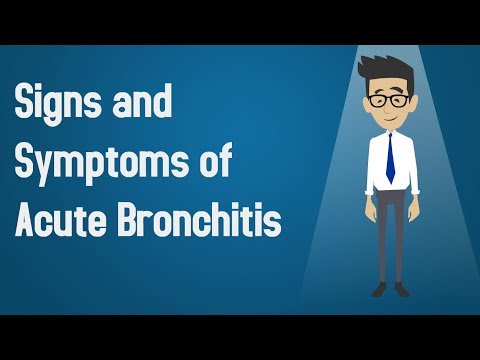If you suspect you have bronchitis, it's important to note that there's a range of different symptoms of bronchitis, including the possibility of being misdiagnosed with an underlying condition. Some symptoms of bronchitis are also associated with asthma, so if you're having difficulty in controlling your asthma, check with your doctor about these symptoms and if possible make a referral for a bronchoscopy.
Bronchitis is often first diagnosed during a visit to your GP or family doctor where a cough or hoarseness can signal an impending bout of cough and fever. Many cases of chronic bronchitis are treated quickly at home with anti-histamines, non-steroidal glucocorticoids (NSAIDs), and lots of fluids.
Bronchitis symptoms vary across different people, but generally include cough, wheezing, sore throat, chest pain and difficulty breathing
You may also notice your eyes watering, tiredness, runny nose and a white stuffy nose. If your symptoms are particularly unusual or if they aren't well explained by the other symptoms, you should visit your GP.
Bronchoscopy is an advanced method of diagnosing chronic bronchitis, but for many people, their symptoms can still be mistaken for other conditions. During a bronchoscopy, your doctor inserts a narrow tube called a bronchoscope into your mouth and down your throat. This device allows your doctor to get a better look at your lungs and airways and may be able to diagnose bronchitis earlier. If your doctor suspects bronchitis, he or she will usually take a lung sample to ensure it isn't a virus, as the symptoms of bronchitis are often very similar to the flu.
Bronchoscopy isn't a surefire way of diagnosing and treating chronic bronchitis, so it's important to take your time and be honest with your doctor. Don't hesitate to admit that you're unsure about whether your symptoms of bronchitis are related to bronchitis. Even if you've had symptoms of chronic bronchitis before, it's important that your doctor gets the full picture to avoid unnecessary delays.

Bronchitis symptoms of cough and fever are particularly important to consider when treating yourself
If you have had chronic bronchitis previously, you might not be aware of the warning signs and your body may still be able to heal itself without treatment. However, even if your symptoms of bronchitis are mild, your doctor should always be aware of them as a lack of treatment could worsen the situation.
Cough and wheezing usually occur at night and in the early morning. These symptoms are fairly common, but they may not show up on a normal test for chronic bronchitis, so it's important that if you suspect you have chronic bronchitis you see your doctor for a thorough test. If the symptoms persist, your doctor may prescribe antibiotics to clear the infection and prevent further complications from occurring.
Bronchitis symptoms of cough and fever include fever and wheezing that cause your breath to become hoarse, but these symptoms aren't always caused by bronchitis alone. The more common symptoms of bronchitis include shortness of breath, chest pain, coughing, chest discomfort, cough that doesn't clear up on its own, sore throat irritation and a feeling of fullness in the chest. Bronchitis is a sign that your body has an infection that needs treatment, so don't ignore the warning signs – get your symptoms tested today.
Bronchitis symptoms may also include a feeling of dizziness, loss of coordination and nausea. If you experience any of these symptoms of bronchitis while you're sleeping, you should consider getting a restful night's sleep immediately, as it could prevent additional complications from developing.
Chronic bronchitis can develop into pneumonia, which is another form of severe respiratory infection. This is one of the most serious forms of bronchitis because it can cause death if untreated. Your doctor can diagnose pneumonia with a CT scan or other diagnostic test. If your symptoms of bronchitis are consistent with pneumonia, you should talk to your doctor and immediately seek medical care for your condition.
Bronchitis symptoms and signs should be treated promptly if you're worried about a disease or illness that you feel is related to bronchitis. Although the majority of cases of bronchitis are easy to treat, you'll still want to make sure your doctor has the full picture and makes sure your signs and symptoms are correct.